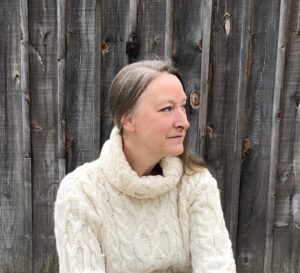We yearn to belong, but when genetic identity is unclear, connections feel tenuous.
By Cindy Fleming
Growing up as an adoptee, I frequently fielded questions from friends and strangers alike. “Do you know who your real mother is?” “Do you think you look like your parents?” “What [ethnicity] are you?” The first two questions were easy to answer: My mother is my real mother. No, I don’t look like either of them. But the third question hounded me my whole life. It speaks to a universal quest to identify with a group. And it speaks to the need of others to figure out who we are. For an adoptee, another question swirls around in the mix: Are we valid?
On one hand, our identity is who we believe we are, and on the other it’s who others believe us to be. In essence, the identity question is two-part: ‘Who am I?’ and ‘Who do you think I am?’ Adopted or not, we work to reconcile our personal vision of who we are versus who others believe we are. Yet when you’re adopted, there’s an added layer. For me, and I imagine for many adoptees, there’s a struggle to answer the question ‘Who are you?’ When others challenge our identity because of our adoption status, it’s difficult enough; but it’s further complicated by the fact that we have incomplete information about our genetic roots and, therefore, we can’t answer. And even when we get that information, we’re still left wondering how others view us.
I was adopted at birth and didn’t know my birth ethnicity until I was an adult. Of course, I had the ethnicity of my adoptive family, but even that was muddled. Muddled, in part, because my parents were somewhat non-traditional in the way they raised me—without strong traditions, based on ethnicity or religion. My parents were raised Jewish, but did not consider themselves religiously Jewish. My mother explained that while we were not religiously Jewish, we were “ethnically Jewish.” What does that mean exactly? I love brisket and knishes. I know what a seder is (a Baptist friend corrected me on a few details). I picked up some Yiddish words listening to conversations between my grandmother and her friends. But does that make me Jewish? From a religious standpoint, it does not. In fact, according to Jewish law, adoption alone doesn’t make you the religion of your adoptive mother. As an adult I learned that my birth mother is Protestant, and children born to non-Jews and adopted by Jewish parents must go through rituals of conversion before they are considered Jewish. I did not.
Inasmuch as being Jewish could be part of my identity—religious or ethnic, I didn’t need to wait until adulthood to know I wasn’t a real Jew. This was established by some of my relatives. Jewish preteens typically prepare for a bar- or bat-mitzvah to be welcomed into the adult Jewish world. When I was about 11, I overheard a relative question another as to why I wasn’t preparing. The answer dismissed me—and my entry into the Jewish adult world—with but one sentence, “She’s not a real Jew.” I remember feeling like an imposter. From then on, despite my mother telling us that we were “ethnically” Jewish, I felt increasingly detached, especially around holiday gatherings. Years later, my non-Jewish status was confirmed by my own mother! I had received a threatening letter from an anti-Semitic group, and before forwarding it to the Southern Poverty Law Center, I showed it to my mother. She waved it away, saying what I’d already heard—“but you’re not really Jewish.”
So, if I can’t claim a Jewish identity— ethnic or religious—then by the same logic, I can’t claim my grandparents’ Ukrainian, Lithuanian, and Austrian ethnic backgrounds either. Back to the drawing board.
No doubt, adoptees have all sorts of reasons for discovering their birth or genetic backgrounds. I actually don’t know what compelled me to seek my birth certificate or to make contact with my birth mother. Even though I’d struggled as a kid to fit in as Jewish, it didn’t occur to me at the time to search for any other ethnic identity. It wasn’t until I was a new mom that I started giving real thought to my birth story. When I requested my records from Maine, I spent several years contemplating whether to write to the woman who brought me into this world. Eventually I did. I projected her need to know about the baby she’d given up, basing that assumption only on my own feelings toward my children—trying to imagine how a woman could part with her child. I thought perhaps she might want to know that I’d had a good life. Or perhaps wondered if she’d want a relationship with me. She did not. But another motivation for my search was to learn of an ethnic identity that I could claim as part of my own. When my birth mother declined contact, I felt like she had denied me a bit of that ethnic identity.
My need to discover more details about my genetic identity waxed and waned after the initial contact with my birth family. Then something clicked. I’m not sure whether it was because the Census questioned my response to the ethnicity question (it changed my response ‘American’ to ‘refused to answer’) or if curiosity finally got the better of me. I ordered a kit from AncestryDNA and within weeks had a breakdown of my genetic heritage.
So what have I done with these results? Besides connecting with half-siblings I never knew I had (that’s another story), I’ve had fun exploring the traditions and places where my DNA originated. At Christmas, I baked and cooked my way through the traditional foods of my genetic ancestors. And I’m hoping to visit or re-visit the countries represented by my DNA. And yet, despite doing these things, I’m still left wondering, does any of it give me a true ethnic identity? Does baking beautiful lussekatter make me Swedish? Does mulling a warm glühwein make me German? When I step off the plane in Scotland, will they recognize their native daughter? Will I feel a part of these places or these people? Or will I still be an imposter?
In our melting pot country, we place so much emphasis on our ethnic heritage: We’re not American, but Irish-American, Chinese-American, Italian-American. Even the Census forces you to record some ethnicity other than American. When you’re adopted, however, it’s complicated. I sometimes wonder why it’s important, but I know that it is. We want to belong. We want to know where we came from. No matter how grounded we are, we yearn to have connections to others. But when you’re adopted these connections can feel tenuous. And I, for one, am still left asking, “Who am I?” and “Who do you think I am?”

Fleming lives in New Hampshire, where she’s a writer. She’s known all her life that she’s an adoptee, but only recently embarked on a journey of discovery. Through searching and genetic testing, she’s connected with new family members, and in joining the adoption conversation has found new opportunities for personal growth and reflection. You can connect with her via Twitter @cidkfleming.
BEFORE YOU GO…
Look on our home page for more articles and essays about NPEs, adoptees, and genetic genealogy.
- Please leave a comment below and share your thoughts.
- Let us know what you want to see in Severance. Send a message to bkjax@icloud.com.
- Tell us your stories. See guidelines.
- If you’re an NPE, adoptee, or donor conceived person; a sibling of someone in one of these groups; or a helping professional (for example, a therapist or genetic genealogist) you’re welcome to join our private Facebook group.
- Like us on Facebook and follow us on Twitter and Instagram @Severancemag.

